Bangladesh Live News | @banglalivenews | 15 Jun 2018
#WorldBank #WorldBankPrimaryEducationBangladesh #Bangladesh #BangladeshEducation #BangladeshPrimaryEducation

Washington: The World Bank has approved $700 million to improve the primary education sector in Bangladesh.
The Quality Learning for All Program (QLEAP) will benefit more than 18 million children studying in pre-primary level to grade 5.
It will finance implementation of the government’s Fourth Primary Education Development Program (PEDP4), read a statement issued by the World Bank.
The Project will help improve quality and equitable access to primary education. It will help assess and improve learning outcomes for Bangla and mathematics for Grade 3 students. For this, the program will develop a stronger curriculum and exam system as well as textbooks and supplementary learning materials, including digital materials. The program will help expansion of one-year quality pre-primary education in all government schools.
“At birth in 1971, Bangladesh had a very low education base. From there, the country has made remarkable progress in improving access to education. Today almost every child steps into a classroom and 8 out of 10 children completes primary education,” said Qimiao Fan, World Bank Country Director for Bangladesh, Bhutan, and Nepal. “This is the fourth World Bank project supporting the Government’s primary education program to help the country achieve its ‘education for all’ vision.”
The Project will bring about one million out-of-school children to learning centers that would follow national primary education curriculum, and thus help them integrate with the formal education system. The project will also build about 95,000 classrooms, teachers’ rooms, and multipurpose rooms to ensure international standard students-to-classroom ratio. It will also build 80,000 Water, Sanitation and Hygiene (WASH) blocks and 15,000 safe water sources with special emphasis on facilities for girl students and female teachers. It will also provide recruitment and training to about 100,000 teachers.
“A major thrust of the project will be to improve school management system and provide professional growth for teachers,” said Syed Rashed Al Zayed, World Bank Team Leader for the project. “The financing will help ensure strong governance, adequate and equitable financing, and good management of the primary education system in Bangladesh.”
The credit from the World Bank’s International Development Association, which provides grants or zero-interest loans, has a 38-year term, including a six-year grace period, and a service charge of 0.75 percent.
The World Bank was among the first development partners to support Bangladesh following its independence. Since then, the World Bank has committed nearly $28 billion in grants and interest-free credits to the country. In recent years, Bangladesh has been among the largest recipients of the World Bank’s interest-free credits.